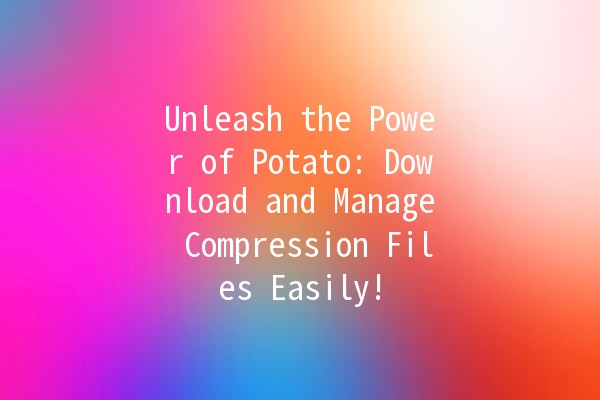In the fastpaced digital landscape, file management is crucial. For users who handle many files daily, understanding the nuances of file compression can yield significant productivity benefits. Whether you are downloading games, software, or other resources, you may encounter compressed files, and knowing how to handle them effectively is essential. This article delves into practical tips on downloading and managing compressed files using Potato, a userfriendly tool designed to optimize your experience.
Understanding Compressed Files
Compressed files help reduce storage space and make file transfer more efficient. Formats such as .zip, .rar, and .7z can considerably decrease file sizes, making it easier to download or share. However, handling these compressed files requires specific software and knowledge to fully utilize their benefits.
Why Use Compression?
Space Efficiency: Compressed files take up less storage, enabling more files to be stored in limited space.
Speed: Smaller files download faster, saving you time, especially important for users on limited bandwidth.

Convenience: Multiple files can be bundled into a single compressed file, simplifying downloads and organization.
Tips for Enhancing Productivity with Potato and Compressed Downloads
To maximize your efficiency when using Potato for downloading and managing compressed files, consider the following productivity tips:
Understanding common file formats (.zip, .rar, .7z) is fundamental. Each format has its peculiarities regarding compression algorithms and extraction methods. For instance, while .zip files can be opened natively on many operating systems, .rar files require additional software like WinRAR.
Practical Application: When you encounter a file, check its format before downloading. If it's a .rar or .7z file, ensure Potato supports it or install necessary software.
Instead of extracting all files from a compressed package, most tools, including Potato, allow you to extract specific files. This feature saves time and space, especially if only certain files are needed.
Example: Imagine downloading a game that comes with various extras, including soundtracks and artworks. By only extracting the game files, you avoid unnecessary clutter.
Establishing a systematic way to organize your downloads helps in maintaining productivity. Create a dedicated folder for downloaded compressed files and subfolders for specific categories like software, games, and documents.
Practical Application: When downloading compressed files through Potato, designate a download directory. Postdownload, immediately sort files into their respective folders to streamline future access.
When dealing with multiple compressed files, batch processing tools can significantly enhance your workflow. Potato offers features that allow you to queue multiple downloads, manage file extraction, and even apply batch renaming to keep everything orderly.
Example: If you have ten software tools to download, set them up in Potato for batch downloading rather than handling each one individually.
After downloading and extracting, if you find that certain files are not frequently used but need to be kept, consider compressing them again for storage. This can help you save disk space while retaining access to the files.
Practical Application: Suppose you've extracted files for a project that is now complete but may be needed later. Compress these files back into a .zip file for easier storage.
Common Issues and Quick Fixes When Downloading Compressed Files
Frequently Asked Questions
What is a compressed file?
A compressed file is a file that has been reduced in size using specific algorithms to save space and make it easier to share or download. Common formats include .zip and .rar.
How do I open a compressed file using Potato?
Use Potato to locate the downloaded compressed file. Rightclick on the file, select "Extract" from the context menu, and specify the destination folder for extracted files.
Can I compress files using Potato?
Yes, Potato allows you to compress files. Simply select the files you want to compress, rightclick them, and choose “Compress” or “Add to Archive” to create a new compressed file.
Why are some compressed files password protected?
Password protection serves to secure the contents within compressed files. This is common for files shared across insecure networks or sensitive documents that require privacy.
How do I convert a compressed file to another format?
While Potato may support direct extraction, to convert a compressed file type (like .zip to .rar), you typically need to first extract the contents and then recompress them as desired.
What should I do if my extraction fails?
If an extraction fails, consider redownloading the file, as it may be corrupted. Ensure you have sufficient disk space and that your extraction software is updated.
By applying these productivity tips, you can effectively manage your compressed files with ease. Using Potato to its fullest potential, from downloading to organization, will streamline your workflow and increase efficiency. Embrace these practices, and make file management a hasslefree experience today!